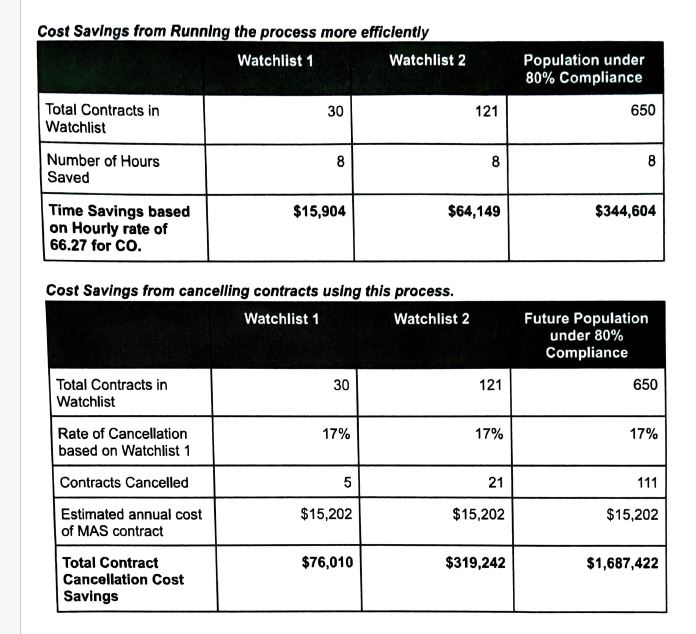Politics
GSA to cut 577 schedule vendors, 31 SINs

The General Services Administration is targeting as many as 577 schedule holders for removal in the next six months.
These are companies who have either not met their sales quota in the last year or have performance or compliance issues.
Additionally, GSA is planning on removing 31 Special Item Numbers (SINs) under the schedules program, including several that average less than $25,000 in annual sales. These include 11 in the professional services category and seven in the office management area.
In all, Federal News Network has learned that GSA expects to save more than $15 million a year through these and other consolidation efforts, which are part of several ongoing initiatives GSA is pursuing to consolidate and make the schedules program more efficient.
“These MAS adjustments will allow FAS to streamline the buying process, provide access to competitive pricing and quality products and services and minimize the time that agency customers will need to make buying decisions,” said Josh Gruenbaum, the commissioner of the Federal Acquisition Service at GSA, in an email statement to Federal News Network.
GSA kicked off many of these efforts before Gruenbaum became FAS commissioner, but a February decision paper obtained by Federal News Network shows that the agency plans to turn many of these efforts up several notches.
Limited success in the past
Jeff Koses, GSA’s senior procurement executive, and Mark Lee, the assistant commissioner in the Office of Policy and Compliance, outlined four short terms plans for the next 45 days. They also detailed three long-term efforts to expand a contractor compliance pilot project started last year.
While this has been a goal of every previous administration, cutting the “deadwood” off the schedules has found limited success. In 2012, GSA found as many as 60% of contractors on some of the schedule contracts received little or no business. At the time, FAS leadership said it would implement a new Demand Based Model, which will let the agency focus on the products and services agency customers want the most, closing down the underused schedules to new companies. Then in 2014, GSA said it cut about 1,000 vendors from Schedule 70 for IT services for not meeting the minimum annual sales requirement of $25,000 a year. GSA said that move saved the agency about $3.2 million a year in administrative costs.
Alan Thomas, the former commissioner of the Federal Acquisition Service during the first Trump administration, said what GSA is doing is a natural outgrowth of the ongoing schedule consolidation effort that kicked into gear in 2018.
“It’s a natural follow-on to eliminate vendors who have low sales. During the pandemic and for other reasons, GSA had soften its rules around that a little bit. But now this is just some clean up and an appropriate tightening of some of those rules particularly around low sales vendors,” said Thomas, now the founder of AlphaTango Strategies, in an interview with Federal News Network. “This isn’t crazy stuff and given the administration’s focus on efficiency and streamlining, it’s a natural area to look at. It moves the needle a little bit. It’s a good useful step and a good business housecleaning.”
Another former GSA official, who requested anonymity in order to talk to the press, said the reductions make a lot of sense.
“These contracts are like zombie contracts — they just are sitting there,” said the former official. “I find it hard to find a downside other than folks could argue it’s anti-small business. But if you aren’t meeting the goals over four years of the contract, which aren’t that high, then your contract deserves to be cancelled.”
Focus is on sales, performance issues
GSA says there are 456 vendors in the first phase slated for elimination based on not meeting their sales criteria. GSA set a basic minimum for contractors in their first five-year contract to sell at least $100,000 and for the second five-year option to sell at least $125,000 total.
There currently is about 18,000 vendors on the schedule contract.
“For various reasons, including the pandemic, concerns on growing the industrial base and strong pushback, GSA softened its approach to low and no sales contracts, and created the current version of the clause, which gives more time for contractors to meet an increased dollar threshold for sales. As a result, the number of low and no sales contracts built up into the hundreds,” Koses and Lee wrote. “Contracting officers have a clear contractual right to not exercise options. Neither regulatory or policy changes are required; however FAS can create a culture of more strictly adhering to the sales thresholds through existing methods of training and communicating with the acquisition workforce. Such actions may generate strong pushback from individual contractors, industry groups, the Small Business Administration, members of Congress and various other stakeholders.”
The former GSA official said industry and congressional pushback were two main reasons why this effort had limited success previously.
“The only downside that I see if vendors could reapply to get on the schedule after being removed. But if you weren’t successful the first time, I’m not sure why would you do that?” the former official said.
Thomas said too often vendors get on the schedule and think they are done.
Part of the reason for that is GSA own messaging. The agency has promoted vendors to view the schedules as the first step to get into the federal market.
Thomas said before a contractor does that, however, they need to make sure there are agency customers who want to buy what the company is selling.
“You can get on the schedule relatively quickly and efficiently and for the amount of business out there, it’s a fairly low bar in terms of cost,” he said. “But since I’ve been out of GSA, I’ve worked with number of companies who want to develop a strategy to get on the schedule right away. I tell them what they need to do is find an end user that needs your product or service, and then determine if the schedule is the right vehicle to satisfy that customer.”
The former GSA official added GSA spends a lot of time training vendors on how to use the schedule to their benefit. But too often companies, especially small firms, think they are done once they receive the schedule contract.
Must justify extending a schedule contract
A GSA spokesperson told Federal News Network that contracting officers have the authority to decide whether to let the schedule contract expire or not.
“FAS recommends allowing MAS contracts to expire if they don’t meet the sales requirements in FSS Clause I-FSS-639—unless the CO can clearly show that extending the contract is the best option for meeting the government’s needs, considering price and other key factors,” the spokesperson said.
A second prong to this effort will target 121 contractors with non-compliance, including poor performance issues. Koses and Lee say these 121 contractors could be put on a “watch list” and could be terminated if their compliance doesn’t improve over the next three months.
Koses and Lee said GSA launched a pilot last August reviewing 30 schedule holders across eight factors, including regulatory compliance, timely delivery and meeting other various requirements.
“Increasing availability of big data tools have given FAS the room to define and pilot an effort to drive better contractor compliance,” Koses and Lee wrote. “By utilizing the recently developed Suppliers’ Compliance Scorecard to identify and monitor non-compliance contractors, FAS drove performance improvements for 25 of the 30 contractors.”
GSA there are about 650 contractors as of Aug. 9 with a performance score under 80% based on their scorecard. GSA estimated it could save $2 billion, of which $1.7 billion would come from not having to manage these contracts any longer.
Source: February 2025 decision paper from GSA.
GSA offered more details about its plans to reduce SINs in a new blog post. Along with cutting 31 SINs, FAS also plans on changing the specifics in four of the categories, including professional services and IT.
“This set of contracts carries the lowest risk, including the least likelihood of strong Congressional or industry pushback, and emphasizes a cultural message of performance and accountability,” Koses and Lee wrote.
For example, under the IT category, GSA plans to add several new subcategories, including cloud services to include artificial intelligence and machine learning; financial management services, which would move from the IT solution category and include the services from the Financial Management Quality Service Management Office (FM QSMO); and incident handling and event management under the cybersecurity SIN.
“GSA is taking the first step in refining the MAS program by identifying items with low market demand, or with high administrative costs that outweigh their benefits,” the agency spokesperson said. “We value our partnerships and are committed to keeping our stakeholders informed as we move forward with these improvements. Updates to the vendor community will follow soon.”
The post GSA to cut 577 schedule vendors, 31 SINs first appeared on Federal News Network.
Politics
Black Lives Matter Activist in Boston Pleads Guilty to Federal Fraud Charges – Scammed Donors to Fund Her Lifestyle

Screencap of YouTube video.
A Black Lives Matter activist in Boston named Monica Cannon-Grant pleaded guilty to federal charges this week, admitting that she scammed donors and used their money to fund her own lavish lifestyle.
Cannon-Grant was previously held up as an admired figure. The city of Boston named her the Bostonian of the year at one point for her ‘social justice activism’ and she was even recognized by the Boston Celtics basketball team for her efforts.
She is now facing a minimum of two years in prison.
The New York Post reports:
BLM-linked activist admits conning donors to fund her lavish lifestyle
A once-celebrated Boston social activist has pleaded guilty to defrauding donors — including Black Lives Matter — out of thousands of dollars that she used as a personal piggy bank.
Monica Cannon-Grant, 44, pleaded guilty Monday to 18 counts of fraud-related crimes that she committed with her late husband while operating their Violence in Boston (VIB) activists group, according to the US Attorney’s Office in Massachusetts.
The activist scammed money — including $3,000 from a BLM group — while claiming it was to help feed children and run protests like one in 2020 over the murder of George Floyd and police violence.
Cannon-Grant also conned her way into getting $100,000 in federal pandemic-related unemployment benefits — which she used to pay off her personal auto loan and car insurance policy.
But she has now confessed to transferring funds to personal bank accounts to pay for rent, shopping sprees, delivery meals, visits to a nail salon — and even a summer vacation to Maryland.
Just amazing.
Monica Cannon-Grant stole from donors, scammed the government, and lived it up while preaching about oppression. BLM grift is the only nonprofit where fraud is part of the mission statement. https://t.co/ir3q9lqYrh
— Matthew Newgarden (@a_newgarden) September 23, 2025
BREAKING: BLM activist Monica Cannon-Grant pleads guilty to 27 fraud charges, misusing over $1M from Violence in Boston for personal gain. Echoes Sir Maejor Page’s $450K scam conviction. A wake-up call for nonprofit accountability. pic.twitter.com/N9vvD369gB
— (@pr0ud_americans) September 14, 2025
Here’s a local video report:
She should pay back every penny.
The post Black Lives Matter Activist in Boston Pleads Guilty to Federal Fraud Charges – Scammed Donors to Fund Her Lifestyle appeared first on The Gateway Pundit.
Politics
Keith Olbermann Backpedals Furiously With Apology for Threatening CNN’s Scott Jennings – Jennings Responds (VIDEO)

As the Gateway Pundit reported yesterday, former MSNBC host and generally unhinged leftist Keith Olbermann, appeared to threaten CNN’s conservative pundit Scott Jennings on Twitter saying, ‘You’re next motherf**ker.’
Well, Olbermann may have gotten a phone call or a visit from the FBI because today he walked back those comments with a full-throated apology.
RedState has an update:
To quickly recap, Scott Jennings, a Salem Media Network radio host and conservative CNN political commentator, reacted to breaking news on Monday that Kimmel had been reinstated by tweeting, “So basically his employer suspended him for being an insensitive pr**k, and we don’t live in an authoritarian regime? Got it.”
This enraged Olbermann, who proceeded to tweet what many, including Jennings, perceived to be a threat. “You’re next, motherf**ker. But keep mugging to the camera.” Jennings tagged Patel and included a screengrab of the tweets in response.
Though the FBI hasn’t commented as to whether an investigation was launched, Olbermann ostensibly appears to have thought twice about what he tweeted and deleted, apologizing profusely in tweets posted on Tuesday and claiming what he wrote was “misinterpreted”:
See Olbermann’s tweet below:
I apologize without reservation to @ScottJenningsKY
Yesterday I wrote and immediately deleted 2 responses to him about Kimmel because they could be misinterpreted as a threat to anything besides his career. I immediately replaced them with ones specifying what I actually meant. pic.twitter.com/SPWLb73nEk
— Keith Olbermann (@KeithOlbermann) September 23, 2025
I oppose and condemn political violence, and the threat of it. All times are the wrong time to leave even an inadvertent impression of it – but this time is especially wrong
I should've acknowledged the deletion and apologized yesterday. I'm sorry I delayed.
— Keith Olbermann (@KeithOlbermann) September 23, 2025
Scott Jennings, always a class act, offered this hilarious response:
SCOTT JENNINGS: “Marking myself SAFE from that NUT, Keith Olbermann!” pic.twitter.com/EYZX6vm5Oh
— Dustin Grage (@GrageDustin) September 23, 2025
Keith Olbermann really needs help. The guy is just so out of control.
The post Keith Olbermann Backpedals Furiously With Apology for Threatening CNN’s Scott Jennings – Jennings Responds (VIDEO) appeared first on The Gateway Pundit.
Politics
Where is Lance Twiggs? Kirk Assassin’s Transgender Lover Has Vanished

 Charlie Kirk assassin Tyler Robinson and roommate Lance Twiggs
Charlie Kirk assassin Tyler Robinson and roommate Lance Twiggs
Charlie Kirk assassin Tyler Robinson lived with his transgender partner – a male-to-female trans named Lance “Luna” Twiggs.
The FBI used Robinson’s texts with his transgender partner to solidify that Robinson was the assassin. Lance Twiggs has not been charged with any crime; however, federal authorities are still investigating.
Last week, Utah authorities released the text exchange between Tyler Robinson and his transgender lover, Lance Twiggs, sent shortly after Kirk’s assassination.
Utah County District Attorney Jeff Gray announced seven charges against Charlie Kirk assassin Tyler Robinson. They will also be seeking the death penalty.
Robinson was charged with:
– Count 1: Aggravated murder (capital offense)
– Count 2: Felony reckless discharge of a firearm causing bodily injury
– Count 3: Felony obstruction of justice for hiding the firearm
– Count 4: Felony obstruction of justice for discarding the clothing he wore during the shooting
– Count 5: Witness tampering for asking roommate to delete incriminating messages
– Count 6: Witness temperating for demanding trans roommate stay silent, and not speak to police
– Count 7: Commission of a violent offense in the presence of a child
Jeff Gray released the chilling texts between Tyler Robinson and his “love” Lance Twiggs.
Read the text exchange here:
 Tyler Robinson texts with transgender lover Lance Twiggs / 1
Tyler Robinson texts with transgender lover Lance Twiggs / 1
 Kirk assassin Tyler Robinson texts with transgender lover Lance Twiggs / 2
Kirk assassin Tyler Robinson texts with transgender lover Lance Twiggs / 2
Lance Twiggs was reportedly cooperating with the FBI, however, according to the Daily Mail he has seemingly vanished.
“If [Lance Twiggs] ever comes back, it will be in a body bag,” a neighbor said to the Daily Mail. “That’s not a threat – I’m just saying that there are so many people who want a piece of him he’d be mad to show his face in public again. This was a generational event.”
The Daily Mail reported:
The Trans boyfriend of Charlie Kirk’s alleged assassin has fled their former lovenest – and locals tell the Daily Mail they never want to see him again.
Lance Twiggs, 22, was led away for questioning when police swooped on the smart three-bed condo he shared with accused gunman Tyler Robinson, 22.
Shaken neighbors say the part time plumber has not been back to the $320,000 property in St. George, Utah – one declaring: ‘Good riddance. I never want to see either of them again.’
His beaten-up Infinity compact is still parked in his space with his work gear tossed across the back seat and a sandwich wrapper and a drink on the front passenger seat.
Upstairs lights have been left on for more than a week and notes and Amazon packages are piling up outside the home owned by Twiggs’s devout Mormon family.
The post Where is Lance Twiggs? Kirk Assassin’s Transgender Lover Has Vanished appeared first on The Gateway Pundit.
-

 Entertainment6 months ago
Entertainment6 months agoNew Kid and Family Movies in 2025: Calendar of Release Dates (Updating)
-

 Entertainment3 months ago
Entertainment3 months agoBrooklyn Mirage Has Been Quietly Co-Managed by Hedge Fund Manager Axar Capital Amid Reopening Drama
-
Tech6 months ago
The best sexting apps in 2025
-

 Entertainment5 months ago
Entertainment5 months agoKid and Family TV Shows in 2025: New Series & Season Premiere Dates (Updating)
-

 Tech7 months ago
Tech7 months agoEvery potential TikTok buyer we know about
-
Tech7 months ago
iOS 18.4 developer beta released — heres what you can expect
-

 Tech7 months ago
Tech7 months agoAre You an RSSMasher?
-

 Politics7 months ago
Politics7 months agoDOGE-ing toward the best Department of Defense ever



